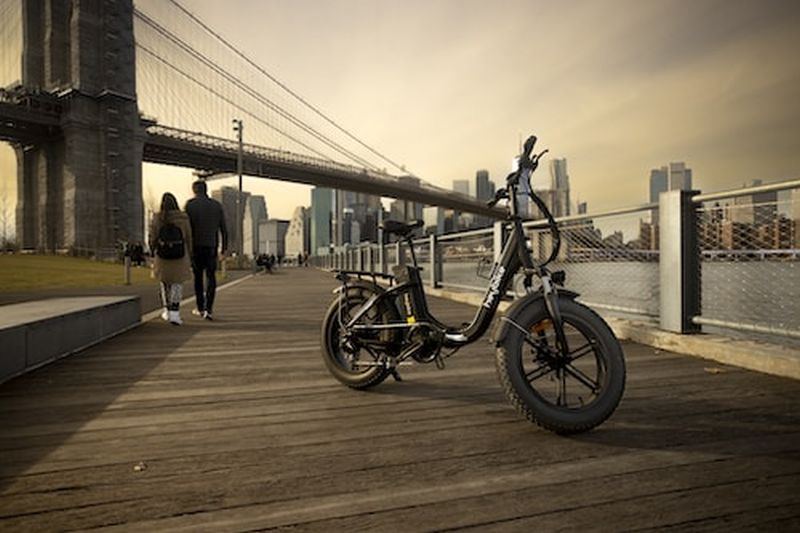In recent years, the landscape of urban transportation has been witnessing a significant shift. This transition is both innovative and eco-friendly. This change is majorly attributed to the rise of electric bicycles, commonly known as e-bikes.
The core appeal of e-bikes lies in their ability to augment human power, not replace it. This means they offer the traditional exercise benefits of a standard bicycle but with a twist. The electric motor in these bikes assists riders, making it easier to cover longer distances, climb hills, and reduce the effort needed in headwinds.
This assistance is particularly beneficial for those who may find physical exertion challenging, such as older adults or individuals with physical limitations.
Moreover, e-bikes are revolutionizing urban mobility by offering a more accessible and flexible mode of transportation. They are particularly advantageous in densely populated cities, where traffic congestion is a perennial issue.
Riders can maneuver through traffic more quickly compared to cars, and often, e-bikes are faster for short to medium distances in urban settings. This enhanced mobility not only saves time but also reduces the stress associated with daily commutes.
1. Sustainable and Efficient Transportation

Electric bikes represent a significant leap towards sustainable and efficient urban transportation. They strike a fine balance between the ease of a motor vehicle and the environmental friendliness of a bicycle.
The keyword here is “efficiency.” Electric bikes require significantly less energy than cars or motorcycles. This low energy consumption translates to reduced carbon footprints, making e-bikes a green solution for daily commuting.
Moreover, e-bikes can play a crucial role in reducing the reliance on fossil fuels. As cities across the globe grapple with the challenges of pollution and climate change, e-bikes emerge as a practical solution that is both eco-friendly and cost-effective.
They require less space for parking, contribute to reduced noise pollution, and their electric nature means zero emissions during operation.
Furthermore, the advancement in battery technology has made e-bikes more accessible and practical. Modern e-bikes come equipped with long-lasting batteries, which can cover significant distances on a single charge. This durability not only adds to the convenience but also enhances the appeal of e-bikes as a reliable mode of transportation for daily commuters.
2. Health and Fitness Benefits

E-bikes are not just about getting from point A to point B; they are also an excellent tool for health and fitness. While it’s true that the electric motor assists the rider, pedaling is still required, meaning that an e-bike ride still constitutes a form of exercise.
This aspect is particularly beneficial for individuals looking to incorporate more physical activity into their daily routine without the intensity of traditional cycling.
The beauty of e-bikes lies in their ability to be as physically demanding as the rider desires. One can choose to pedal more and use less assistance for a more intense workout or rely more on the motor during tired or lazy days.
This flexibility makes e-bikes an excellent option for people at different fitness levels and with varying physical capabilities.
Additionally, e-bikes make cycling more appealing to a broader audience. People who might be intimidated by the physical demands of traditional bikes find e-bikes more accessible. This inclusivity encourages more people to take up cycling, leading to a healthier population.
Regular use of e-bikes can improve cardiovascular health, build muscle strength, and contribute to overall well-being.
3. Economic Advantages
From an economic standpoint, e-bikes present a multitude of benefits. For the individual, the cost savings are evident when compared to owning and maintaining a car. The initial investment in an e-bike is considerably lower than that of a car, and the ongoing expenses such as fuel, insurance, and maintenance are minimal.
For city dwellers who primarily rely on short to medium-distance travel, an e-bike can effectively replace a car, leading to significant savings.
For businesses, especially those in the delivery sector, e-bikes offer a cost-effective and efficient solution. They can navigate through traffic more easily, find parking quicker, and the low operational costs make them an economically viable option for small-scale and large-scale businesses alike.
Furthermore, the rise of e-bikes has stimulated economic activity in other sectors. The demand for e-bikes has led to a growing industry dedicated to their manufacturing, sales, and service. This industry not only creates jobs but also drives innovation in areas such as battery technology, motor efficiency, and cycling infrastructure.
4. Enhancing Social Connectivity

E-bikes also play a role in enhancing social connectivity. They make it easier for people to travel and meet, thereby fostering community interactions. E-bikes can bridge the gap for those who find distances too far to walk and too short to drive, making social visits and community engagements more feasible.
Additionally, the growing e-bike community provides a platform for social interaction among enthusiasts. Group rides, e-bike clubs, and online forums create spaces where individuals can share experiences, tips and form new friendships.
This aspect of e-bikes goes beyond mere transportation; it cultivates a sense of community and belonging among its users.
5. Advancing Technological Innovation
E-bikes are at the forefront of advancing technological innovation in personal transportation. This progression is not solely about their electric propulsion systems; it encompasses a wide range of features that make e-bikes more than just bicycles with motors.
The integration of smart technology in e-bikes is a prime example. Many modern e-bikes come equipped with GPS and Bluetooth connectivity, allowing riders to track their routes, monitor their fitness levels, and even lock their bikes remotely.
This technological integration transforms the e-bike into a smart, connected device that appeals to the tech-savvy generation.
Conclusion
E-bikes are not just a trend; they are a sustainable, efficient, and inclusive mode of transportation poised to reshape the future of urban mobility.
By offering a blend of environmental, economic, health, and social benefits, e-bikes stand out as a compelling choice for the modern commuter and an integral part of the solution to today’s urban challenges.

